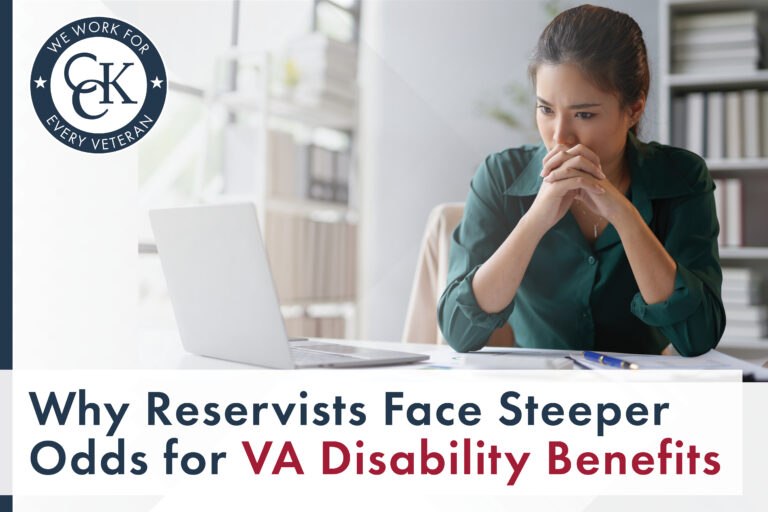Why Reservists Face Steeper Odds for VA Disability Benefits

CCK Law: Our Vital Role in Veterans Law
Despite making up over one-third of America’s military force, reservists and National Guard members face a troubling disparity in how their disability claims are handled by the Department of Veterans Affairs (VA).
According to a landmark report from the U.S. Government Accountability Office (GAO-24-105400), VA disability compensation claims from reserve component members are denied at significantly higher rates than those from active-duty veterans, raising serious questions about fairness, access, and systemic gaps in documentation and policy.
Key Findings from GAO Report GAO-24-105400
Between 2012 and 2021, VA approved 66 percent of initial disability claims from reserve component members, compared to 82 percent for active duty. That gap persisted to varying degrees across every branch, rank, age, and demographic category studied.
Additional Disparities Highlighted in the GAO Report
The GAO report also highlighted the following disparities:
- Race and Ethnicity: Black reservists had the lowest approval rate (just 48 percent) compared to 71 percent for White reservists.
- Sex: Reserve component women had a 60 percent approval rate versus 67 percent for reserve men; both were well below their active-duty counterparts.
- Rank: Junior enlisted reservists saw approval rates as low as 56 percent, significantly lower than officers or warrant officers.
Why Are Reserve Claims Denied More Often?
The GAO identified several root causes, many of which stem from the unique structure of the reserve service and gaps in documentation practices.

1. Lack of Immediate Medical Documentation
All 15 stakeholders interviewed by the GAO agreed: many reservists do not know that they must immediately document injuries or illnesses during duty to support future disability claims. Unlike active-duty troops, reservists often lack continuous access to military healthcare or command support when they get injured.
2. Poor Recordkeeping of Duty Periods
VA claims processors struggle to verify the specific dates of qualifying service, particularly for drill weekends and two-week annual training periods. Until recently, official military forms did not consistently capture this data. A new form (DD 214-1) is being developed, but its implementation across service branches has been inconsistent and poorly planned.
3. VA’s Limited Access to Training Records
VA does not have a reliable system to verify whether a reservist’s injury occurred during a qualifying duty status, such as Title 10 or Title 32 federal orders. Without a formal “Line of Duty” (LOD) determination, many claims are denied due to a lack of evidence, even when the disability is legitimate.
How Lower Reservist Approval Rates Affect Veterans
The stakes are high. A denied disability claim can delay or deny access to vital benefits such as medical care, housing stipends, and vocational training. More broadly, this systemic inequity undermines the nation’s promise to care for all who serve.
As the nation increasingly relies on its Reserve and National Guard forces, it must also close the benefits gap that leaves many part-time warriors behind. Until structural changes are made, it is essential for reservists and their advocates to be proactive, informed, and persistent.
GAO Recommendations: What Must Change
The GAO issued 14 recommendations, including:
- Education: The Department of Defense (DoD) and VA must issue clear, accessible guidance to reservists on documenting service-related injuries as they occur.
- Implementation of DD 214-1: The military must apply sound project planning to ensure all qualifying duty is properly recorded on this new form.
- Data Improvements: VA must develop or gain access to reliable records of reservists’ monthly drill dates and annual training periods.
- Transparency: VA and DoD must better communicate known data limitations, particularly for older veterans whose records may be incomplete.
Both VA and DoD have concurred with these recommendations, at least in principle.
What Can Reservists and Veterans Do?
If you are a reservist or recently transitioned veteran considering a disability claim:
- Document Everything: Seek a Line of Duty (LOD) determination immediately if injured while serving. Include medical records and service orders.
- File Promptly: Delayed onset conditions may not qualify unless clearly linked to time in service.
- Consult a VSO: Many reservists’ claims are initially denied simply because of missing or misunderstood paperwork. VA-accredited representatives can help build the strongest case possible.
- Appeal: If a reservist’s claim is denied, they should consider contacting a VA-accredited law firm—ideally one with experience with federal court appeals—for a case evaluation. A veterans law firm should have significantly more experience working with poorly defined VA regulations and veterans law.
Appealing a VA Decision? Contact CCK Law
CCK Law is the nation’s leading veterans law firm.
- We have represented over 18,000 veterans and their dependents at the U.S. Court of Appeals for Veterans Claims and over 12,500 before the Department of Veterans Affairs.
- CCK Law employs over 100 individuals who are accredited by VA or admitted to practice before the U.S. Court of Appeals for Veterans Claims, and we have recovered over $1 billion in wrongfully defined benefits for veterans and dependents since 1999.
- With unparalleled court experience, we have argued many of the most precedent-setting cases in veterans law, shaping and clarifying benefits in ways that affect millions of veterans.
To schedule your free case evaluation, reach out to CCK Law as soon as possible at (800) 544-9144 or by submitting a message through our contact form.
About the Author
Share this Post
